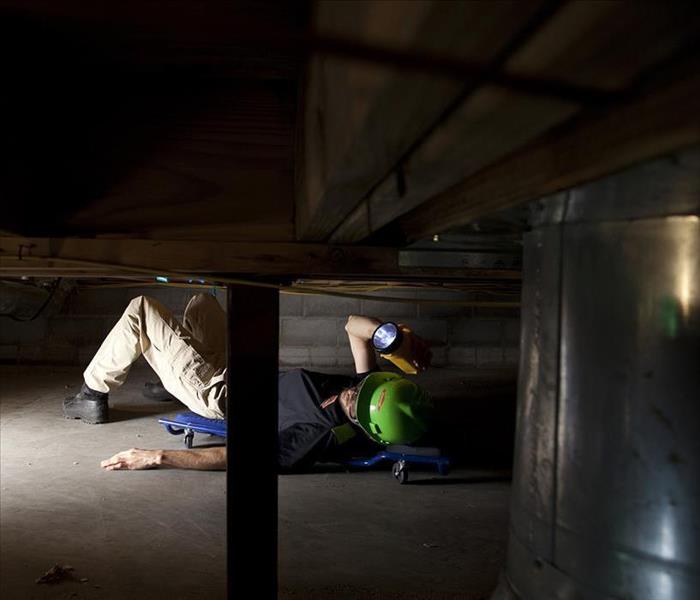Increased Mold Risk in Commercial Buildings due to Prolonged Closures
4/12/2021 (Permalink)
 Highly trained SERVPRO technician inspects crawlspace for moisture and mold growth on wood beams and ductwork.
Highly trained SERVPRO technician inspects crawlspace for moisture and mold growth on wood beams and ductwork.
Molds can be found almost anywhere and they do not need much to grow indoors. Mold spores float through the air constantly and when they land on damp areas indoors, they may begin spreading. After a full year of shutdowns due to the pandemic, many commercial buildings in Massachusetts have been closed for prolonged periods of time. Without HVAC systems operating daily, temperature fluctuations are going to occur which could cause condensation at various locations in the structure. Also, older buildings typically have tighter envelopes that do not allow for proper ventilation. With buildings being closed and no regular airflow from open windows, doors, and HVAC systems – moisture will not be ventilated. Mold can grow quickly on ceiling tiles, carpet, drywall, wallpaper, fabrics, and insulation. Leaks from plumbing pipes, outdoor gutters, or sinks naturally occur over time and can be addressed if noticed but, if left unnoticed will create a perfect environment for mold to thrive. All of these factors and more are acting together in commercial buildings across the Commonwealth. Molds have the potential to cause health effects especially in those with asthma or mold allergies. Here are five steps you can take to minimize mold risk after a prolonged shutdown of your commercial property:
- Maintain as low a humidity level as possible in the structure – never exceeding 50%. Building managers should use a hygrometer to monitor humidity levels daily.
- After a prolonged shutdown, the property should be thoroughly inspected before reopening. An inspection from an industrial hygienist is ideal and if they detect anything, remediation is required immediately to prevent further spread.
- After an inspection has confirmed there is no mold in the structure or remediation of mold has occurred you need to flush the HVAC system. Run the HVAC system for at least 48 to 72 hours with outdoor air dampers set to the max setting. If an odor is detected look for mold and have remediation completed if mold is discovered in the HVAC system. Complete another flush of the system until no odors or mold is present. You should replace your filters or at the very least clean them before reopening the building.
- After the building is reopened be sure to routinely monitor your HVAC system and its filters.
- If there is no routine maintenance program in place for your HVAC system, now is the time to create one. Inspection, calibration, testing, balancing, and cleaning of the system regularly is vital to keeping indoor air quality at healthy levels.
Here at SERVPRO of Lexington, Bedford, Waltham, Wayland, Weston, and Watertown we can help with your commercial mold and HVAC needs. We have a team of highly trained professionals to remediate mold with advanced techniques and equipment. We also offer comprehensive HVAC and duct cleaning services making us the only call you need to make before reopening your property after being closed due to the pandemic.






 24/7 Emergency Service
24/7 Emergency Service